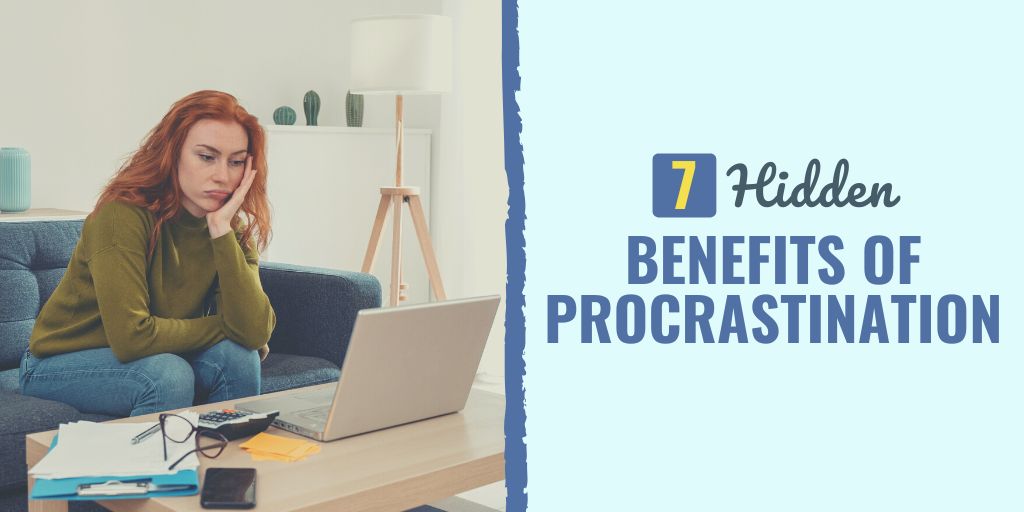There might be affiliate links on this page, which means we get a small commission of anything you buy. As an Amazon Associate we earn from qualifying purchases. Please do your own research before making any online purchase.
Procrastinating usually gets a bad rap, but did you know there are hidden benefits of procrastination?
Procrastination is my best friend; and because I’m a perfectionist, putting off tasks until the very last moment helps ease the pressure. I also tend to focus better on the project at hand. Plus, I’ve learned that I work better under pressure, even though the stress of not doing stuff when I probably should is anxiety-causing (and I have a stomach ulcer or two as a result).
But despite people labeling those of us who favor procrastinating as lazy, unmotivated, careless, unprofessional, and disorganized, you can benefit from delaying doing a task until you absolutely have to do it.
Procrastination can be self-defeating, and it’s also a habit that’s not easy to shake off. However, I say if procrastination works for you, enjoy it. At least you get a couple of benefits from this kind of behavior.
Here’s everything you should know about procrastination, the causes, the types of personalities it usually affects, and the hidden benefits if you are keen to try putting off a task or two.
What Is Procrastination?
Procrastination comes from the Latin words “procrastinat,” meaning to “defer till the morning,” and “procrastinus,” which translates to “belonging to tomorrow.” This is quite an apt description of what procrastination is: a task that you defer, delay, or put off until later, whether it is a few hours from now, tomorrow, or days or weeks from now.
You deliberately, unnecessarily, and habitually put off a project, whether it’s sending a resignation letter, completing school work, doing a chore, or calling your mom, until later, usually right before the deadline (or some extreme cases, even after the due date).
While you aren’t busy with the important task you should be focusing on, you complete trivial activities. So while you aren’t doing the laundry, you dive into Facebook, watch funny cat videos on YouTube, or wander aimlessly around the house – doing anything else you can other than the task at hand.
There are various ways in which you can procrastinate. For example, you could delay a task to avoid thinking about it because it makes you anxious, or you can procrastinate because you are easily distracted (#SocialMedia or the next “shiny” thing).
According to Dr. Joseph Ferrari, a professor of psychology, “everyone procrastinates” because we all delay doing something at times, but “not everyone is a procrastinator.” Only 20% of Americans are chronic procrastinators who make procrastinating a way of life. Instead of being “doers,” they are “waiters.”
Key features of procrastination are that:
Reasons Why You Procrastinate
The “why” of procrastination isn’t an easy “diagnosis.” There are various factors that influence whether or not you procrastinate, and whether you are a chronic versus “sometimes” procrastinator. These can also overlap and shift depending on your mood, the task at hand, and circumstances.

Here are the most common reasons why you procrastinate:
Personality Types That Are More Prone to Procrastinating
Any person can be prone to procrastinate and that extends to personality types. It’s just the way in which a person with a certain personality procrastinates that’s different.
Interestingly, a 2016 study found that those with a type A personality (characteristics include having self-control and being results-motivated, impatient, and competitive) can be prone to procrastinate a lot. Apparently, the more stressed these people are and the more they take on, the more they are likely to delay doing a task.
However, type B personalities (those with a laid-back, easy-going, and flexible attitude) are also prone to procrastination and being distracted.
If you look at procrastination and the 16 Myers-Briggs personality types, here’s how these personalities delay projects:
7 Benefits of Procrastination
If you are in the habit of procrastinating, it isn’t easy to let old habits die. It’s even more challenging when there are actually benefits to this so-called bad habit.
Make procrastination your best friend with benefits by learning about what you stand to gain when you delay an activity, project, or chore:
Benefit #1. The Energy Boost
When I procrastinate and focus on other activities rather than writing an article, doing chores, or finishing my art project, I know that I can usually count on the energy boost I get when it is D-day to “wake up” and get my project done. While I put off my task, I suffer from low energy (and low motivation), but the deadline approaching and a fear of failing are powerful motivators.
As adrenaline floods my body, an undesirable or difficult project seems a whole lot easier.
Benefit #2. Get the Task Done in Record Time
Delaying a task until the last minute, means you have less time to complete it than you’d usually have. While I may have 10 days to complete a project for work, leaving it until a day or so before the due date means I need to get it done faster.

Less time spent on the project means I have more time for other things in life, like watching Netflix, working out, and reading.
Benefit #3. Helps You Focus
When you are pressed for time to get something done and you have a rush of energy to help you, you also benefit from laser-focus. Plus, knowing the deadline is looming means you can’t afford distractions and, as a result, you are less likely to be distracted.
You won’t feel compelled to give in to instant gratification by checking your phone, scrolling through Instagram, or researching meaningless stuff on the internet. When it’s time to buckle down and focus, that’s what you do because you can’t fail. Since you focus on only one thing as opposed to multitasking, you are much more efficient too.
For tools to help you stay focused, check out this roundup of the best apps to overcome procrastination.
Benefit #4. Lowers Your Expectations
We sometimes put too much pressure on ourselves. And if you are a perfectionist, procrastinating works in your favor because you can blame poor quality on the “limited deadline” even though you most likely had more than enough time for the task.
Thus, you can lower your expectations too because you will only have some much time to finish the project.
Benefit #5. Makes Tasks Seem Easier
Some projects are just overwhelming, and we have a tendency to make a mountain out of a molehill. I know that a project may seem really challenging and then I fret (way too much) over how I’m going to do it and get it done because it seems so impossible.
When time’s quickly running out and I have to focus on the project, I realize (99% of the time) that it actually wasn’t that complicated after all. But thinking it is difficult helps me justify delaying the project.
Benefit #6. Improves Your Creativity
Need creativity for inspiration? A ticking time bomb (aka your deadline) will surely help trigger your creativity.
A professor of management and psychology, Adam Grant, at the Wharton School wrote about a mini experiment by a former student where the participants had to come up with new business ideas.
Some participants had to generate their ideas straight away, while the others were given five minutes to procrastinate by playing Solitaire or Minesweeper. Those who procrastinated had more original and creative ideas.
So putting off an activity encourages divergent thinking, novelty, and creativity because your brain has more time to subconsciously collect ideas and process it.
I usually say my ideas need to percolate. Like a percolator where coffee is slowly filtered, so my ideas need to “filter” through my brain.
Benefit #7. Decreases Stress (No, Really!)
This may seem like an oxymoron that procrastination can reduce stress, when, in fact, it seems way more likely that the opposite is (and must be) true.
A 2005 study published in the Journal of Social Psychology found that if you have a deadline that’s far off and you procrastinate, you will be less stressed and be physically healthier than if you don’t delay projects.
By procrastinating, you are not just putting off the project but also the accompanying stress and anxiety. When the deadline looms and you need to put your foot on the pedal, you have less time to be stressed or anxious.
Plus, you can knock out a couple of smaller tasks before you need to work and focus on the larger activity you’ve put aside.
Final Thoughts on the Benefits of Procrastination
You can use procrastination to your advantage. Use it to get an energy and focus boost, lower your expectations so you feel less worked up and worried… and so you don’t have too much time to second-guess yourself or the actual activity you need to do.
Unfortunately, you can’t rely on procrastination to carry you through life, especially when it affects the quality of what you are doing. You don’t want to choke under pressure or turn in sub-par work that means you can’t graduate, keep your job, or get promoted.
Think being a chronic procrastinator is doing you more harm than good? Then check out our 14 strategies to overcome procrastination. And want to then dive deeper into this topic? We also have the 21 best books about stopping to procrastinate for you to dive into.
Finally, if you want to level up your productivity and time management skills, then watch this free video about the 9 productivity habits you can build at work.


